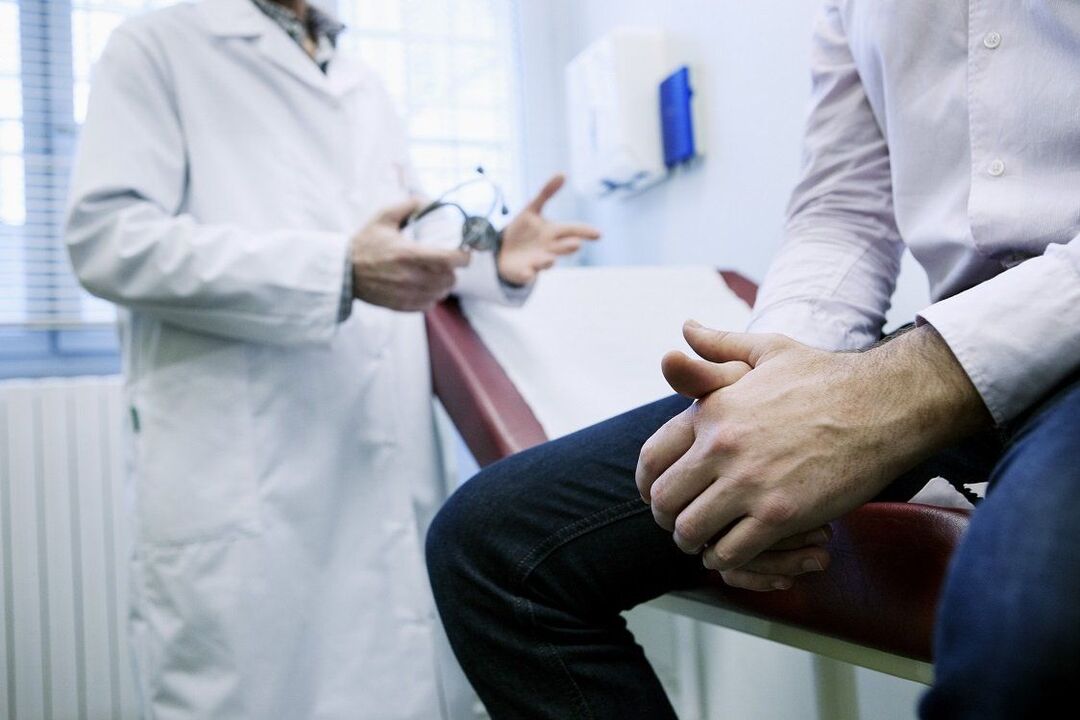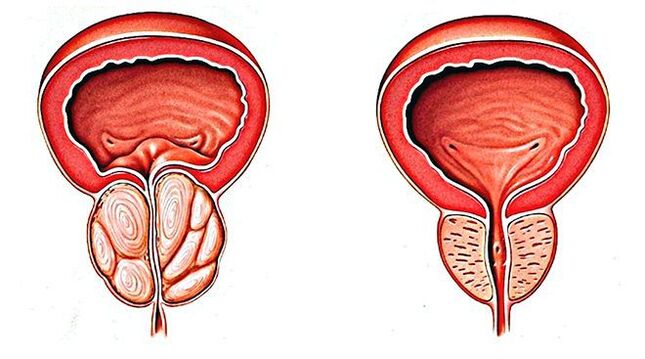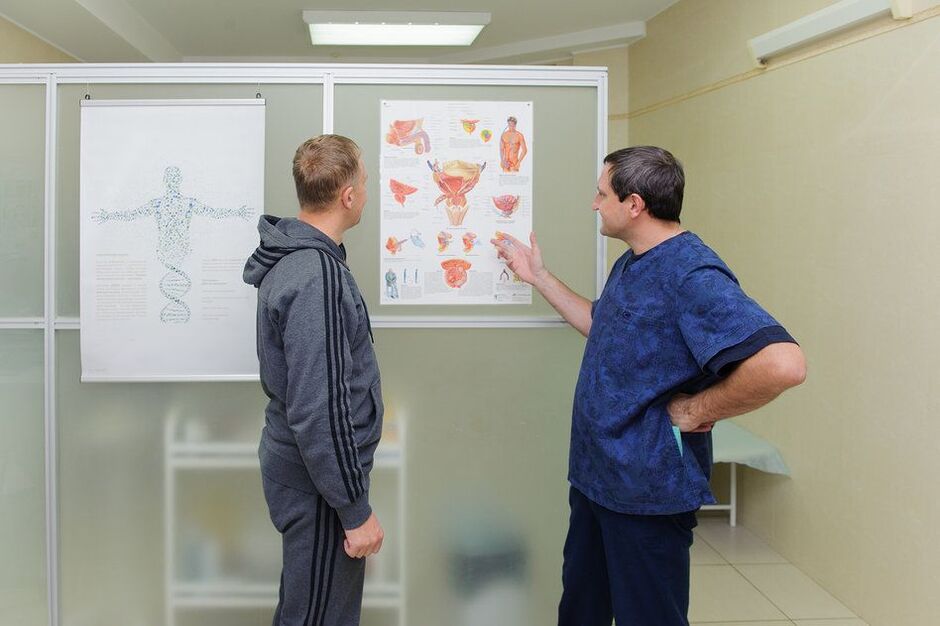Every year, an increasing number of men face sexual problems due to inflammation of the prostate gland, an important organ of the male reproductive system responsible for reproductive function. Treatment of chronic prostatitis should begin as early as possible; the quality of future sexual life depends on this.

The Men's and Women's Health Clinic offers inexpensive, effective treatments for the male prostate at any stage of the disease. A qualified specialist will select the optimal, most effective method that will save you from this unpleasant problem forever. The main thing is not to put off visiting a doctor until later; this will save not only your money, but also shorten the healing time.
The modern clinic offers:
- comprehensive consultation with a urologist;
- diagnostics using modern equipment;
- passing tests and taking analyzes at inexpensive prices;
- advisory support at all stages of treatment, from the first appointment until the patient’s complete recovery.
Even advanced chronic prostatitis can be treated! Make an appointment with a specialist using the convenient form on the website, or ask questions by phone.
Chronic prostatitis, classification
Inflammation can be caused by bacteria, viruses and other microorganisms; it can also be triggered by hypothermia, bad habits, poor diet, and a sedentary lifestyle.
Chronic prostatitis in men manifests itself in different forms:
- Infectious- developing as a result of the harmful effects of microorganisms
- Non-infectious or stagnant- caused by congestion in the pelvis (stagnation of ejaculate, prostate secretion or venous blood)
In advanced cases, when there is no treatment, the usual form of the disease can develop into chronic calculous prostatitis. With this pathology, against the background of inflammation, stones form in the gland itself and its ducts.
Asymptomatic prostatitis is characterized by the absence of symptoms and complaints from the patient and is detected only during examination.
The most common is the abacterial or stagnant type, it is diagnosed in 95% of patients.
Causes of chronic prostatitis
Fundamental factors contributing to the development of the disease:
- lack of physical activity is a direct path to impaired blood supply to the pelvic organs as a result of congestion;
- unhealthy diet, fatty foods, alcohol, smoking;
- frequent restraint during sexual intercourse (for example, in order to avoid an unwanted pregnancy of a partner) or its interruption;
- infection in the genitourinary system due to poor personal hygiene or infection through a partner;
- frequent hypothermia of the body;
- weakened immunity, constipation, inflammatory phenomena in the body, including diseases of the upper respiratory tract;
- endocrine diseases, hormonal imbalances;
- surgical operations on the pelvic organs.
Despite the various causes of chronic prostatitis, the symptoms manifest themselves in the same way. Most often, this is pain and discomfort in the lower abdomen.
Symptoms of chronic prostatitis
Signs of the disease may subside or intensify from time to time. This indicates an inflammatory process. You should not expect that everything will go away on its own or self-medicate, the consequences will be sad - impotence, infertility, oncology.
A modern clinic or men's health center specializing in the treatment of chronic prostatitis has helped hundreds of patients regain sexual viability. It is important not to waste time and seek help if you are concerned about the following symptoms:
- nagging pain in the perineum, radiating to the anus, lower back, inner thigh;
- erectile disfunction;
- premature ejaculation, dullness of sensitivity during and after sexual intercourse;
- frequent (more than twice) urination, especially at night;
- constant feeling of incomplete emptying of the bladder, "sluggish stream. "
Depending on the stage of the disease and the individual characteristics of the body, the symptoms vary, but the pain is constantly increasing and intensifying. With exacerbation, painful sensations during ejaculation, weakening of erection, and infertility are added.

Modern urology distinguishes four categories of chronic prostatitis:
- acute bacterial - type I;
- chronic bacterial - type II;
- abacterial chronic - III type, (with inflammation - IIIa, without inflammation - IIIb);
- asymptomatic - IV type.
Methods for diagnosing chronic prostatitis
If characteristic symptoms are present, the urologist can easily make a diagnosis and additionally conduct a standard survey and examination.
Laboratory diagnostics helps to identify the presence of inflammation, the type of causative agent of the disease, and usually consists of taking and examining blood, urine and prostate secretion tests.
It is also necessary to exclude the presence of prostate adenoma, oncology, tuberculosis, since these are diseases with similar symptoms.
An instrumental examination - ultrasound or TRUS - allows you to determine what changes have occurred in the prostate gland, identify its size, density, the presence of stones, and neoplasms.
Only after making an accurate diagnosis, the doctor decides how to treat chronic prostatitis in this particular case.
Treatment of chronic prostatitis
Depending on the characteristics of each patient’s body and the causes of the disease, the treatment regimen for chronic prostatitis is drawn up individually.
Drug treatment includes a comprehensive intake of painkillers, anti-inflammatory drugs, and in case of an infectious process, antibiotics. The most effective medications for normalizing the outflow and cleaning the prostate. In addition, it is necessary to take vitamins and immunomodulators to nourish damaged tissues; in case of problems with blood circulation, venotonics, anticoagulants, and blood thinning drugs are additionally prescribed.
In a modern clinic, effective treatment of chronic prostatitis includes a unique method - lymphotropic therapy. This is the introduction of drugs subcutaneously into areas located near the lymphatic vessels. At the same time, the absorption of the drug is significantly improved and the effect of the drug is enhanced, since it quickly spreads throughout the lymphatic system, and from there it reaches the desired organ or tissue.

You can improve the outflow of fluid from the prostate and normalize blood circulation in the pelvic organs by signing up for a massage for chronic prostatitis. The procedure is performed by an experienced urologist in the absence of contraindications. For men who are categorically opposed to this method of treatment, it will be useful to perform the following exercises, which also have a positive effect on eliminating congestion in the pelvic area.
- Initial position- feet shoulder-width apart, hands clasped at the back of the head. As you inhale, squat, spreading your knees to the sides as far apart as possible, and as you exhale, take your starting position.
- Standing still, take turns raising your leg with a bent knee, trying to reach your chin.
- Sit on a small ball lying on the floor, stretch your legs, rest your hands, take a comfortable position. Roll the ball with the muscles of the buttocks and genitals, making circular movements with them.
- Lying on your back, hold the ball between your bent knees. Inhaling, squeeze your knees tighter, and exhaling, relax.
Long walks and cycling also stimulate blood flow to the pelvic organs and are recommended in complex therapy.
Additional physiotherapeutic procedures that are performed on the recommendation of a doctor:
- magnetic therapy;
- phonophoresis;
- laser therapy;
- electrical stimulation.
You can get rid of chronic prostatitis, or at least weaken the syndrome, using the following proven folk remedies.
- raw pumpkin seeds or their oil. It is enough to eat a small handful of peeled grains, and use the oil for dressing salads;
- Drink a decoction of dried fruits (pears) without sugar throughout the day;
- green parsley, its seeds and juice are another folk remedy for prostatitis and impotence;
- at home, before going to bed, administer rectally for a month suppositories made from propolis and cocoa butter (sold in pharmacies).
If the course of treatment for chronic prostatitis does not bring the desired result, and the patient’s condition worsens, hospitalization is indicated. In rare cases, when inflammation cannot be treated and becomes life-threatening, surgery is indicated.
Why is chronic prostatitis dangerous? Neglect of the disease, embarrassment and fear of seeking help from a doctor can lead to serious complications. The inflammatory process will eventually spread to the urinary system, and as a result, new diseases (cystitis, urethritis, renal failure, vesiculitis). Long-term inflammation of the reproductive system can lead to the formation of prostate adenoma; at first it is a benign neoplasm, but over time, without proper treatment, it can become malignant.
In addition to the above, complications of chronic prostatitis include infertility, impotence, complete depression, loss of interest in life.
Don't bring yourself to this state! The cost of treatment in any case is incomparable with the cost of your life. A good urologist will build a course of treatment so that you will feel like a full-fledged person who has had a minor problem. How long the course will last depends on your desire to recover and timely contact with a specialist. The prognosis is favorable in most cases.
After treatment of chronic prostatitis, repeated tests are taken, the results of which confirm recovery (the levels of leukocytes in the blood are normalized, the result is negative for the presence of bacterial flora in the prostate fluid).
Recommended Diet
It is important to drink enough fluid, this helps flush out pathogenic flora and also facilitates the process of urination.
The diet for chronic prostatitis excludes everything spicy, fried and salty. It is also better to remove alcohol and sweet soda from the diet. You can only drink dry wine in small doses.

Food should be easily digestible - fiber, whole grains, seafood. Pumpkin, sesame, and flax seeds must be included in the daily menu.
Prevention of chronic prostatitis
Following these simple rules will help preserve men's health for many years and maintain it at the proper level:
- daily morning and evening hygiene procedures;
- regular sex with a regular partner;
- morning jogging or brisk walking for at least 10-15 minutes;
- rejection of bad habits;
- annual preventive examinations with a urologist.
Now you know what to do for chronic prostatitis. Patiently follow all the doctors’ recommendations, do not stop the treatment you started when you improve, so as not to start all over again later. Be healthy!






























